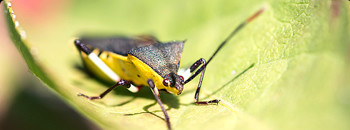National Invasive Species Awareness Week (Feb. 23-28) kicks off today with industry professionals and government officials encouraging each of us to become aware of and work to reduce invasive species threats to our health, economy, environment, and natural resources. According to the U.S. Fish and Wildlife Service, damage from invasive species costs the United States an estimated $120 billion a year and is an increasingly important topic that demands our attention and action.
Invasive species are non-native plants, bugs, and animals. They can produce skin irritations, trigger allergies and poison pets, livestock, and humans. Without our combined efforts invasive species in our environment will continue to be difficult to control. They can clog waterways, kill native trees, ornamentals, and prized native flowers and plants. They can be found in every habitat imaginable, including oceans, parks, urban environments, yards, and gardens.
In observance of National Invasive Species Awareness Week, we challenge you to start regular investigations of your own. The easiest part is you don’t even have to leave the comfort of your own home. Following are ways you can help keep your family and community healthy and safe:
- Visit the U.S. Environmental Protection Agency (EPA) website at www.epa.gov and find out what’s invasive around you.
- Learn to identify common invaders and recognize new ones if they invade. If you live in the Northeast U.S., download and review the Debug the Myths poster “Invasive Species of the Northeast” by clicking on the image below. You are an important first line of defense in invasive species identification and management.
- Check trees, gardens, vacant lots, roadsides, yards, agricultural areas, wetlands, ponds, and lakes. Early detection is crucial to stopping the spread of invasive species.
Do your part by being aware and reporting invasive species in your community. If you see a pest, report it to your local Fish and Wildlife Service, Department of Natural Resources, or county agent. With your help, we can protect so much of what we value the most!
To learn more about keeping your family and community healthy and safe, visit DebugTheMyths.com. You can also follow Debug the Myths on Facebook at https://www.facebook.com/debugthemyths and Twitter @DebugTheMyths.


